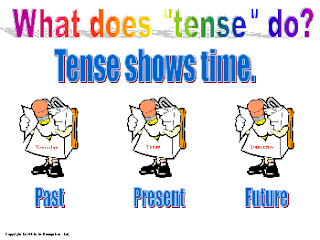
Definition of past tense:
A grammatical tense that expresses actions or states in the past. When we talk about a single event that happened prior to a specified time, we use the past tense. The past tense of 'to be' is was or were. The past tense of most other verbs is formed by adding -ed to the base form of the verb.
Forms of Past Tense:
1)Simple Past Tense
- Formed for regular verbs by adding '-d' or '-ed' to the root word.
e.g. He kicked the ball into his own goal.
- Forms negations by using 'did not' and infinitive form of verb.
e.g. He did not kick the ball into his own goal.
- Forms questions by using 'did' at the beginning of sentence.
e.g. Did he kick the ball into his own goal?
- Used to describe events that have passed unless they are viewed as occurring continuously.
2)Past Progressive Tense
-Formed by using 'was' or 'were' and present participle of main verb.
e.g. He was going to church.
They were going to church.
-Forms negations by adding 'not' before the main verb.
e.g. He was not going to church.
They were not going to church.
-Forms questions by fronting 'was' or 'were'.
e.g. Was he going to church?
e.g. Were they going to church?
3)Past Habitual Tense(2 forms)
First Form:
-Created by 'used to' and the bare form of the main verb.
-Used with an action verb to show that something happened repetitively.
e.g. I used to frequent this mall.
-Used with a stative verb to indicate that a state was continuously in effect
e.g. I used to be a member of this club.
Second Form:
-Uses auxiliary verb 'would'.
-Must be used with an explicit time frame.
e.g. Last June, I would go there daily.
4)Past Perfect Tense
-Formed by combining simple past form of 'to have' and past participle of main verb.
e.g. We had shouted.
-Forms negation by adding 'not' after 'had'.
e.g. You had not spoken.
-Questions in past participle must start with 'had'.
e.g. Had he laughed?
-Conveys that an action occurred before a specified time in the past.
5)Past Perfect Progressive Tense
-Formed by 'had','been' and present participle of main verb.
e.g. You had been waiting.
-Forms negation by adding 'not' before 'been'.
e.g. I had not been waiting.
-Forms questions by starting with 'had'.
e.g. Had she been waiting?
-Use 'since' or 'for' to place emphasis on duration that continues to reference time in the past.
e.g. We had been waiting for hours/We had been waiting since 9p.m..
1)Simple Past Tense
- Formed for regular verbs by adding '-d' or '-ed' to the root word.
e.g. He kicked the ball into his own goal.
- Forms negations by using 'did not' and infinitive form of verb.
e.g. He did not kick the ball into his own goal.
- Forms questions by using 'did' at the beginning of sentence.
e.g. Did he kick the ball into his own goal?
- Used to describe events that have passed unless they are viewed as occurring continuously.
2)Past Progressive Tense
-Formed by using 'was' or 'were' and present participle of main verb.
e.g. He was going to church.
They were going to church.
-Forms negations by adding 'not' before the main verb.
e.g. He was not going to church.
They were not going to church.
-Forms questions by fronting 'was' or 'were'.
e.g. Was he going to church?
e.g. Were they going to church?
3)Past Habitual Tense(2 forms)
First Form:
-Created by 'used to' and the bare form of the main verb.
-Used with an action verb to show that something happened repetitively.
e.g. I used to frequent this mall.
-Used with a stative verb to indicate that a state was continuously in effect
e.g. I used to be a member of this club.
Second Form:
-Uses auxiliary verb 'would'.
-Must be used with an explicit time frame.
e.g. Last June, I would go there daily.
4)Past Perfect Tense
-Formed by combining simple past form of 'to have' and past participle of main verb.
e.g. We had shouted.
-Forms negation by adding 'not' after 'had'.
e.g. You had not spoken.
-Questions in past participle must start with 'had'.
e.g. Had he laughed?
-Conveys that an action occurred before a specified time in the past.
5)Past Perfect Progressive Tense
-Formed by 'had','been' and present participle of main verb.
e.g. You had been waiting.
-Forms negation by adding 'not' before 'been'.
e.g. I had not been waiting.
-Forms questions by starting with 'had'.
e.g. Had she been waiting?
-Use 'since' or 'for' to place emphasis on duration that continues to reference time in the past.
e.g. We had been waiting for hours/We had been waiting since 9p.m..
Circumstances in which past tense verbs can be used :
- the event is in the past
- the event is completely finished
- we say (or understand) the time and/or place of the event

- I lived in that house when I was young.
- He didn't like the movie.
- What did you eat for dinner?
- John drove to London on Monday.
- Mary did not go to work yesterday.
- Did you play tennis last week?
- I was at work yesterday.
- We were not late (for the train).
- Were you angry?
We use this tense in English to talk about events or situations that are finished. Normally we use a time reference.
For example:

- "Last year, I went to Spain."
- "In 1997, he changed his job."
- "She called an hour ago.
Done By: Mohamed Asyraf (25)
Steven Tanjung(9)
Ashvin Kenth(4)
Nicholas Lau(19)
I get irritated, nervous, very tense or stressed, but never bored. See the link below for more info.
ReplyDelete#tense
www.ufgop.org